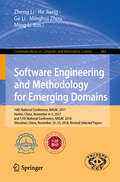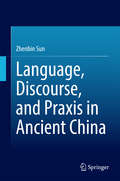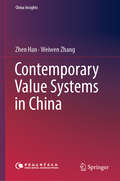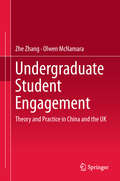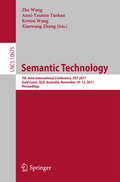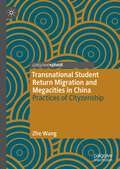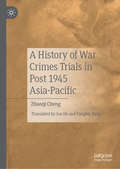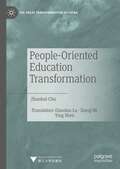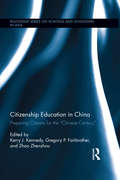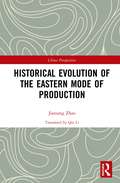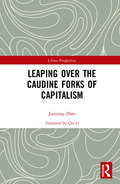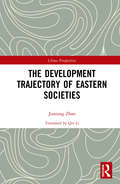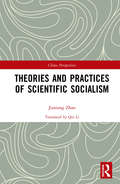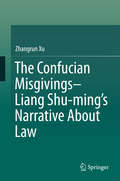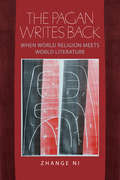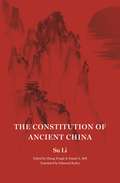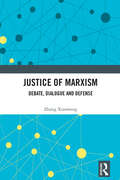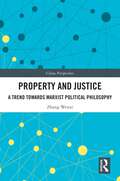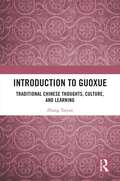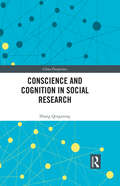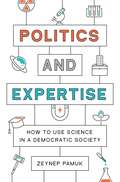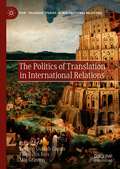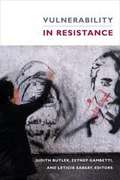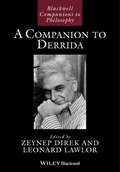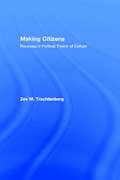- Table View
- List View
Software Engineering and Methodology for Emerging Domains: 16th National Conference, NASAC 2017, Harbin, China, November 4–5, 2017, and 17th National Conference, NASAC 2018, Shenzhen, China, November 23–25, 2018, Revised Selected Papers (Communications in Computer and Information Science #861)
by Ming Li Zheng Li Minghui Zhou He Jiang Ge LiThis book constitutes the thoroughly refereed proceedings of the 16th National Conference, NASAC 2017, held in Harbin, China, in November 2017, and the 17th National Conference, NASAC 2018, held in Shenzhen, China, in November 2018. The 6 revised selected papers were selected from 17 submissions for NASAC 2017, and 5 revised selected papers were selected from 20 submissions for NASAC 2018. The papers focus on all aspects of software engineering, e.g. requirements engineering, software methodologies, software analytics, software testing and evolution, and empirical studies.
Language, Discourse, and Praxis in Ancient China
by Zhenbin SunThis book investigates Chinese comprehension and treatment of the relationship between language and reality. The work examines ancient Chinese philosophy through the pair of concepts known as ming-shi. By analyzing the pre-Qin thinkers' discourse on ming and shi, the work explores how Chinese philosophers dealt with issues not only in language but also in ontology, epistemology, ethics, axiology, and logic. Through this discourse analysis, readers are invited to rethink the relationship of language to thought and behavior. The author criticizes and corrects vital misunderstandings of Chinese culture and highlights the anti-dualism and pragmatic character of Chinese thoughts. The rich meaning of the ming-shi pair is displayed by revealing its connection to other philosophical issues. The chapters show how discourse on language and reality shapes a central characteristic of Chinese culture, the practical zhi. They illuminate the interplay of Chinese theories of language and Dao as Chinese wisdom and worldview. Readers who are familiar with pragmatics and postmodernism will recognize the common points in ancient Chinese philosophy and contemporary Western philosophy, as they emerge through these chapters. The work will particularly appeal to scholars of philosophy, philosophy of language, communication studies and linguistics.
Contemporary Value Systems in China (China Insights)
by Zhen Han Weiwen ZhangThis work illustrates China’s values and how they are practiced. After introducing readers to the theories, systematical structure, historical status, and influence of traditional Chinese values, it points out major developmental trends in connection with modernization. Further, it explores the significance of the contemporary reconstruction of Chinese values and argues that these values can be divided into three layers: values-based goals of national development, Chinese values concepts, and norms of values in a civil society. On this basis, it subsequently interprets the core socialist values “Prosperity, Democracy, Civility and Harmony,” the value concepts “Freedom, Equality, Justice and Rule of Law” and values-based norms “Patriotism, Dedication, Integrity and Friendship.”
Undergraduate Student Engagement: Theory and Practice in China and the UK
by Zhe Zhang Olwen McNamaraThis book focuses on undergraduate student engagement in China and the UK. It offers an innovative perspective on this aspect, which, although pervasive, is not always acknowledged by its users to be complex and multidimensional in nature, firmly rooted in cultural, social and disciplinary norms, and difficult to measure. Competition within the global higher education market has become increasingly intense amongst universities; and the higher education sector in China, currently the largest source of international students, is beginning to compete strongly for its home market. Against this consumerist background, student engagement, with its close relation to positive learning outcomes, is increasingly receiving attention from higher education managers and researchers who seek to improve the quality of their ‘products’.The research study on which the book is based draws on three courses, two in China and one in the UK. It offers a binary perspective across two very different cultures (Western and Confucian) and two very different subject areas (Chinese language and mathematics). The study employs a mixed-methods design and develops a conceptual framework derived from statistical and thematic analysis. An original theoretical lens, combining a bioecological perspective (Bronfenbrenner) and a sociocultural one (Holland et al.’s Figured Worlds), adds further interpretive power to help understand the construct of student engagement.
Semantic Technology: 7th Joint International Conference, JIST 2017, Gold Coast, QLD, Australia, November 10-12, 2017, Proceedings (Lecture Notes in Computer Science #10675)
by Zhe Wang Anni-Yasmin Turhan Kewen Wang Xiaowang ZhangThis book constitutes the thoroughly refereed proceedings of the 7th Joint International Semantic Technology Conference, JIST 2017, held in Goldcoast, QLD, Australia, in November 2017. The 19 full papers and 4 short papers presented were carefully reviewed and selected from 37 submissions. They present applications of semantic technologies, theoretical results, new algorithms and tools to facilitate the adoption of semantic technologies and are organized in topical sections on ontology and data management; ontology reasoning; linked data and query; information retrieval and knowledge discovery; knowledge graphs; and applications of semantic technologies.
Transnational Student Return Migration and Megacities in China: Practices of Cityzenship
by Zhe WangThis book is a study of the return migration of overseas Chinese students. By 2018, over 3.5 million Chinese students had returned from overseas universities to China, with the megacities of Beijing, Shanghai, and Shenzhen representing by far their main destinations. In other words, when overseas students return to China, many do not return to their hometown but usually land, work and settle down in Beijing, Shanghai and Shenzhen. Their return migration is thus not only transnational, but also internal-urban. This book adopts a multi-level geographical analysis to explore this important phenomenon, exploring why and how returnees choose these three cities and how they experience and interpret their everyday lives in these megacities after their return. In doing so, it highlights the importance of cultural logics and multiscalar thinking of transnational Chinese students’ return migration and illuminates how their transnational migration reproduces domestic socio-spatial inequalities. This book brings an important contribution to the fields of Cultural Geography, Urban Geography, Transnationalism, Migration Studies and Citizenship Studies.
A History of War Crimes Trials in Post 1945 Asia-Pacific
by Zhaoqi ChengWritten by the Director of the Tokyo Trial Research Centre at China's Shanghai Jiao Tong University, this book provides a unique analysis of war crime trials in Asia-Pacific after World War II. It offers a comprehensive review of key events during this period, covering preparations for the Trial, examining the role of the War Crimes Commission of the United Nations as well as offering a new analysis of the trial itself. Addressing the question of conventional war crimes, crimes against humanity, crimes against peace (such as the Pearl Harbor Incident) and violations of warfare law, it follows up with a discussion of post-trial events and the fate of war criminals on trial. Additionally, it examines other Japanese war crime trials which happened in Asia, as well as considering the legacy of the Tokyo trial itself, and the foundation of a new Post-War International Order in East Asia.
People-Oriented Education Transformation (The Great Transformation of China)
by Zhaohui ChuThis book explores the reforms sweeping China's educational sector. Traditionally dominated by rote learning, China's educational system has increasingly been criticized by the rising middle class for failing to foster creativity, for arbitrary placement of students, and for fostering regional inequities. Reforms to make Chinese education "people-oriented" are slowly but surely gaining steam, as the sector embraces comprehensive reforms. This book will be of interest to journalists, educators, and China watchers.
Citizenship Education in China: Preparing Citizens for the "Chinese Century" (Routledge Series on Schools and Schooling in Asia)
by Kerry J. Kennedy Gregory P. Fairbrother Zhao ZhenzhouThere is a flourishing literature on citizenship education in China that is mostly unknown in the West. Liberal political theorists often assume that only in democracy should citizens be prepared for their future responsibilities, yet citizenship education in China has undergone a number of transformations as the political system has sought to cope with market reforms, globalization and pressures both externally and within the country for broader political reforms. Over the past decade, Chinese scholars have been struggling for official recognition of citizenship education as a key component of the school curriculum in these changing contexts. This book analyzes the citizenship education issues under discussion within China, and aims to provide a voice for its scholars at a time when China’s international role is becoming increasingly important.
Historical Evolution of the Eastern Mode of Production (China Perspectives)
by Zhao JiaxiangIn the four volumes of The Development Trajectory of Eastern Societies and the Theories and Practices of Socialism, the author re-examines Marx and Engels’ theories on the development trajectory of Eastern societies by integrating theoretical analysis of Marxist theories and a historical investigation of socialist revolution and socialist construction around the world. This second volume focuses on Marx and Engels’ historical materialism, explains the general laws of historical development, and brings this to bear within the context of Eastern societies. The author notes that Marx and Engels’ historical materialism and its derivative theories on Eastern societies are compatible and interconnected. In addition, he reveals how Marx and Engels’ theory of the “Asiatic mode of production” plays an important part in the development trajectory of Eastern societies, and is closely related to their theory of “five social forms.” This volume is a key reference for readers who study and are interested in Marxism, Marxist philosophy, and the history of philosophy.
Leaping Over the Caudine Forks of Capitalism (China Perspectives)
by Zhao JiaxiangIn the four volumes of The Development Trajectory of Eastern Societies and the Theories and Practices of Socialism, the author re-examines the Marx and Engel’s theories on the development trajectory of Eastern societies by integrating theoretical analysis of Marxist theories and a historical investigation of socialist revolution and construction around the world. This volume discusses the desire of the Russian commune to “leap over the Caudine Forks of capitalism,” which means to avoid the torments of the capitalist system, according to Marx and Engels’ theories. The author argues that it is essential to use the logic intrinsic in Marx and Engels’ own works rather than those of subsequent disciples such as Lenin as well as other leaders in the Soviet Union or within China’s contemporary socialism. Readers who study Marxism, Marxist philosophy, philosophical history, and the history of philosophy will find this volume interesting.
The Development Trajectory of Eastern Societies (China Perspectives)
by Zhao JiaxiangIn the four volumes of The Development Trajectory of Eastern Societies and the Theories and Practices of Socialism, the author re-examines Marx and Engels’ theories on the development trajectory of Eastern societies by integrating theoretical analysis of Marxist theories and a historical investigation of socialist revolution and socialist construction around the world. Pointing out the guiding significance of five aspects of the basic principles of Marxism for studying how Eastern societies develop, this volume interrogates various assumptions that have prevailed in academia, addresses unexplained topics, and offers insight into the understanding of these basic principles. The result is a penetrating and specific understanding of Marxist basic principles and the development trajectory of Eastern societies. Critical engagement with predominant understandings and a refreshing reformulation of Marxist theoretical bases make the book a key new reference for readers who are studying or are interested in Marxism, Marxist philosophy, and the history of philosophy.
Theories and Practices of Scientific Socialism (China Perspectives)
by Zhao JiaxiangIn the four volumes of The Development Trajectory of Eastern Society and the Theories and Practices of Socialism, the author re-examines Marx and Engel’s theories on the development trajectory of the Eastern societies by integrating theoretical analysis of Marxist theories and a historical investigation of socialist revolution and construction around the world. This volume discusses the victories and failures of the 100-year trajectory of socialism. Since the Russian Revolution of October 1917, socialism has been practiced for nearly a hundred years in countries at various stages of development. The author provides a proper synthesis of the lessons derived from socialism’s first hundred years as well as China's reforms and interaction with the world. In addition, he analyzes Marx and Engels' socialist theories and their significance for contemporary social development in Eastern societies. Readers who study Marxism, Marxist philosophy, philosophical history and the history of philosophy will find this volume of immense interest.
The Confucian Misgivings--Liang Shu-ming’s Narrative About Law
by Zhangrun XuThe major intellectual interest throughout this book is to offer a study on China's legal legacy, through Liang Shu-ming's eyes. The book follows the formula of the parallel between Life and Mind (人生与人心), Physis and Nomos, and compares Liang Shu-ming's narrative with his own practical orientation and with the theories of other interlocutors. The book puts Liang Shu-ming into the social context of modern Chinese history, in particular, the context of the unprecedented crisis of meaning in the legal realm and the collapse of a transcendental source for Chinese cultural identity in the light of modernity. The evaluation provided by this narrative could be helpful in clarifying the deep structures and significance of the present Chinese legal system through historically exploring Liang Shu-ming's misgivings. The book is intended for academics of legal, history and cultural studies. The book is unique in that it is the first book to explore New Confucian's considerations on reconstruction of Chinese legal system in the modern era. It presents a comprehensive systematical comparison of Liang Shu-ming's narrative about constitutional government in China against other schools of thought.
The Pagan Writes Back: When World Religion Meets World Literature (Studies in Religion and Culture)
by Zhange NiIn the first book to consider the study of world religion and world literature in concert, Zhange Ni proposes a new reading strategy that she calls "pagan criticism," which she applies not only to late twentieth- and early twenty-first-century literary texts that engage the global resurgence of religion but also to the very concepts of religion and the secular. Focusing on two North American writers (the Jewish American Cynthia Ozick and the Canadian Margaret Atwood) and two East Asian writers (the Japanese Endō Shūsaku and the Chinese Gao Xingjian), Ni reads their fiction, drama, and prose to envision a "pagan (re)turn" in the study of world religion and world literature. In doing so, she highlights the historical complexities and contingencies in literary texts and challenges both Christian and secularist assumptions regarding aesthetics and hermeneutics. In assessing the collision of religion and literature, Ni argues that the clash has been not so much between monotheistic orthodoxies and the sanctification of literature as between the modern Western model of religion and the secular and its non-Western others. When East and West converge under the rubric of paganism, she argues, the study of religion and literature develops into that of world religion and world literature.
The Constitution of Ancient China (The Princeton-China Series)
by Daniel A. Bell Edmund Ryden Su Su Li Zhang YongleHow was the vast ancient Chinese empire brought together and effectively ruled? What are the historical origins of the resilience of contemporary China's political system? In The Constitution of Ancient China, Su Li, China's most influential legal theorist, examines the ways in which a series of fundamental institutions, rather than a supreme legal code upholding the laws of the land, evolved and coalesced into an effective constitution.Arguing that a constitution is an institutional response to a set of issues particular to a specific society, Su Li demonstrates how China unified a vast territory, diverse cultures, and elites from different backgrounds into a whole. He delves into such areas as uniform weights and measurements, the standardization of Chinese characters, and the building of the Great Wall. The book includes commentaries by four leading Chinese scholars in law, philosophy, and intellectual history--Wang Hui, Liu Han, Wu Fei, and Zhao Xiaoli—who share Su Li's ambition to explain the resilience of ancient China's political system but who contend that he overstates functionalist dimensions while downplaying the symbolic. Exploring why China has endured as one political entity for over two thousand years, The Constitution of Ancient China will be essential reading for anyone interested in understanding the institutional legacy of the Chinese empire.
Justice of Marxism: Debate, Dialogue and Defense
by Zhang XiaomengThis book analyzes Marxian theories of justice within the context of contemporary political philosophy and intellectual history. Transcending perspectives from classical Marxism, the author analyzes how Western Marxism has engaged with critically and responded to the theories of justice, especially since the 1970s. The nine chapters cover major intellectual movements and multi-dimensional frameworks of thought that critique and understand anew the idea of justice, including anglophone debates on Marxism and justice, global distributive justice, and viewpoints from analytical Marxism, radical egalitarianism, the Frankfurt School, Marxian feminism and ecological Marxism. The second part of the book returns to the classical texts of Marxism, with a focus on historical materialism and a critique of capitalism to reinterpret basic tenets of justice in Marxism and to reconstruct Marxian theory of justice. This title will be of value to scholars and students interested in theories of justice, Marxian philosophy and political philosophy.
Property and Justice: A Trend Towards Marxist Political Philosophy (China Perspectives)
by Zhang WenxiThis book attempts to answer the question “what on earth is the Marxist political philosophy?” The author discusses Karl Marx's vision of the good life and the good society, focusing in particular on the interrelationship between property and justice. Strictly speaking, the subject of the present book should not be placed within an a priori conceptual framework, which essentially focuses on academic notions of the good society, good government and justice. However, for the purposes of this book, Marxist political philosophy, namely communism, is already embodied in two aspects. This book argues that it is the noisy and confusing modern political philosophy that obscures the actualisation of human nature unfolded by the Marxist political philosophy before us. The book will be essential reading for students and scholars of philosophy, Marxism, Chinese studies and Chinese Marxist philosophy.
Introduction to Guoxue: Traditional Chinese Thoughts, Culture, and Learning
by Zhang TaiyanThis book is a collection of Zhang Taiyan's lectures on traditional Chinese thoughts, culture, and learning. Zhang Taiyan is known for his role as an active proponent of Guoxue (Chinese learning) in modern China. This title comprises the transcripts of a series of his lectures on Guoxue given in Shanghai between April and June 1922, and serves as an insightful and influential companion to Guoxue. It systematically introduces the research methods of Guoxue and the development and schools of Chinese classical studies, Chinese philosophy, and Chinese literature, and provides a brilliant analysis of representative figures and works from various periods. It also touches on a wide range of topics in Chinese history, philology, paleography, bibliology, and geography. This book provides Guoxue with many new and thought-provoking ideas and plays a crucial role in the dissemination of Guoxue throughout the world. This title will be essential reading for students and scholars of Sinology and Chinese Studies, as well as for the general public interested in traditional Chinese culture.
Conscience and Cognition in Social Research (China Perspectives)
by Zhang QingxiongThis book is a critical examination of the different roles of conscience and cognition in social research in China and the West, exploring how the two traditions can enrich each other and help societies navigate through the complex intellectual and moral crises of our time.Drawing on a rich array of primary and secondary sources, this title traces the development of the Confucian conception of conscience, from Confucius and Mencius to Xiong Shili and Mou Zongsan, two representatives of Neo-Confucianism. This primacy of a moral sense is compared and contrasted with the tension within the Western culture between strains that place a premium on understanding and a deep commitment to the search for meaning in such philosophers as Habermas and Heidegger. The author explicates why such a commitment is essential to social research and how the focus on instrumental rationality that has defined modernity may be corrected by recentering the role of conscience on intellectual inquiry in general. To that end, both Chinese and Western cultures have plenty to offer both in terms of substantive insights and research methodologies.The book will be a crucial reference for scholars and students interested in Western philosophy, comparative philosophy and Chinese philosophy.
Politics and Expertise: How to Use Science in a Democratic Society
by Zeynep PamukA new model for the relationship between science and democracy that spans policymaking, the funding and conduct of research, and our approach to new technologiesOur ability to act on some of the most pressing issues of our time, from pandemics and climate change to artificial intelligence and nuclear weapons, depends on knowledge provided by scientists and other experts. Meanwhile, contemporary political life is increasingly characterized by problematic responses to expertise, with denials of science on the one hand and complaints about the ignorance of the citizenry on the other.Politics and Expertise offers a new model for the relationship between science and democracy, rooted in the ways in which scientific knowledge and the political context of its use are imperfect. Zeynep Pamuk starts from the fact that science is uncertain, incomplete, and contested, and shows how scientists’ judgments about what is significant and useful shape the agenda and framing of political decisions. The challenge, Pamuk argues, is to ensure that democracies can expose and contest the assumptions and omissions of scientists, instead of choosing between wholesale acceptance or rejection of expertise. To this end, she argues for institutions that support scientific dissent, proposes an adversarial “science court” to facilitate the public scrutiny of science, reimagines structures for funding scientific research, and provocatively suggests restricting research into dangerous new technologies.Through rigorous philosophical analysis and fascinating examples, Politics and Expertise moves the conversation beyond the dichotomy between technocracy and populism and develops a better answer for how to govern and use science democratically.
The Politics of Translation in International Relations (Palgrave Studies in International Relations)
by Zeynep Gulsah Capan Filipe Dos Reis Maj GrastenThis volume concerns the role and nature of translation in global politics. Through the establishment of trade routes, the encounter with the ‘New World’, and the circulation of concepts and norms across global space, meaning making and social connections have unfolded through practices of translating. While translation is core to international relations it has been relatively neglected in the discipline of International Relations. The Politics of Translation in International Relations remedies this neglect to suggest an understanding of translation that transcends language to encompass a broad range of recurrent social and political practices. The volume provides a wide variety of case studies, including financial regulation, gender training programs, and grassroot movements. Contributors situate the politics of translation in the theoretical and methodological landscape of International Relations, encompassing feminist theory, de- and post-colonial theory, hermeneutics, post-structuralism, critical constructivism, semiotics, conceptual history, actor-network theory and translation studies. The Politics of Translation in International Relations furthers and intensifies a cross-disciplinary dialogue on how translation makes international relations.
Vulnerability in Resistance
by Judith Butler Zeynep Gambetti Leticia SabsayVulnerability and resistance have often been seen as opposites, with the assumption that vulnerability requires protection and the strengthening of paternalistic power at the expense of collective resistance. Focusing on political movements and cultural practices in different global locations, including Turkey, Palestine, France, and the former Yugoslavia, the contributors to Vulnerability in Resistance articulate an understanding of the role of vulnerability in practices of resistance. They consider how vulnerability is constructed, invoked, and mobilized within neoliberal discourse, the politics of war, resistance to authoritarian and securitarian power, in LGBTQI struggles, and in the resistance to occupation and colonial violence. The essays offer a feminist account of political agency by exploring occupy movements and street politics, informal groups at checkpoints and barricades, practices of self-defense, hunger strikes, transgressive enactments of solidarity and mourning, infrastructural mobilizations, and aesthetic and erotic interventions into public space that mobilize memory and expose forms of power. Pointing to possible strategies for a feminist politics of transversal engagements and suggesting a politics of bodily resistance that does not disavow forms of vulnerability, the contributors develop a new conception of embodiment and sociality within fields of contemporary power.Contributors. Meltem Ahiska, Athena Athanasiou, Sarah Bracke, Judith Butler, Elsa Dorlin, Basak Ertür, Zeynep Gambetti, Rema Hammami, Marianne Hirsch, Elena Loizidou, Leticia Sabsay, Nükhet Sirman, Elena Tzelepis
A Companion to Derrida (Blackwell Companions to Philosophy)
by Leonard Lawlor Zeynep DirekA Companion to Derrida is the most comprehensive single volume reference work on the thought of Jacques Derrida. Leading scholars present a summary of his most important accomplishments across a broad range of subjects, and offer new assessments of these achievements. The most comprehensive single volume reference work on the thought of Jacques Derrida, with contributions from highly prominent Derrida scholars Unique focus on three major philosophical themes of metaphysics and epistemology; ethics, religion, and politics; and art and literature Introduces the reader to the positions Derrida took in various areas of philosophy, as well as clarifying how derrideans interpret them in the present Contributions present not only a summary of Derrida’s most important accomplishments in relation to a wide range of disciplines, but also a new assessment of these accomplishments Offers a greater understanding of how Derrida’s work has fared since his death
Making Citizens: Rousseau's Political Theory of Culture
by Zev M. TrachtenbergBy analysing Rousseau's conception of the general will, Zev Trachtenberg characterises the attitude of civic virtue Rousseau believes individuals must have to cooperate successfully in society. Rousseau holds that culture affects political life by either fostering or discouraging civic virtue. However, while the cultural institutions Rousseau endorses would motivate citizens to obey the law, they would not prepare citizens to help frame it. Rousseau's view of culture thus works against his account of legitimacy, and Trachtenberg concludes that Rousseau's political theory as a whole is inconsistent.
